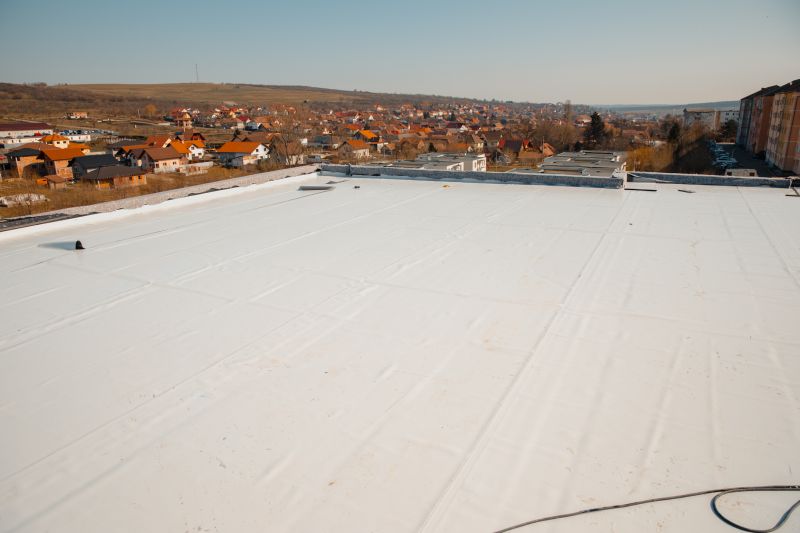Expert Picks for Must-Have Products in Epdm Roof Installations
Find out which tools and materials are favored by experts to ensure a smooth and durable EPDM roofing process.
 EPDM (ethylene propylene diene monomer) roofing is a popular choice for flat and low-slope roofs due to its durability and ease of installation. When selecting products for EPDM roof installations, it's important to consider compatibility, longevity, and ease of use. The right products can help ensure a secure, weather-resistant seal and a long-lasting roof system. Commonly used components include membrane adhesives, seam tapes, primers, and sealants, each serving a specific purpose in creating a cohesive roofing system. Proper application of these materials can contribute significantly to the overall performance of an EPDM roof.
EPDM (ethylene propylene diene monomer) roofing is a popular choice for flat and low-slope roofs due to its durability and ease of installation. When selecting products for EPDM roof installations, it's important to consider compatibility, longevity, and ease of use. The right products can help ensure a secure, weather-resistant seal and a long-lasting roof system. Commonly used components include membrane adhesives, seam tapes, primers, and sealants, each serving a specific purpose in creating a cohesive roofing system. Proper application of these materials can contribute significantly to the overall performance of an EPDM roof.
Top Overall Option
EPDM Roof Seam Tape
EPDM roof seam tape is a versatile product designed to create durable, weatherproof seams in EPDM roofing systems. It adheres effectively to the membrane, providing a continuous seal that helps prevent leaks. This type of tape is easy to apply and is suitable for both new installations and repairs, making it an essential component for ensuring the integrity of the roof. Its flexibility allows it to conform to surface irregularities, enhancing overall sealing performance.
Types of Products For Epdm Roof Installations
EPDM Adhesive
Specialized adhesives designed to bond EPDM membranes securely to various substrates, ensuring a watertight seal and long-term adhesion.
Seam Tape
Self-adhesive tapes used to seal seams and overlaps in EPDM roofing systems for enhanced leak protection.
Primer
Primers prepare surfaces for adhesive bonding, improving adhesion especially on challenging or non-porous substrates.
Sealant
Flexible sealants used to seal around penetrations, edges, and seams to prevent water infiltration.
Edge Metal Flashing
Metal components installed at roof edges and terminations to provide a durable barrier and improve water runoff.
Roof Coatings
Protective coatings applied over EPDM membranes to enhance UV resistance and extend roof lifespan.
Cleaning Solutions
Products used to clean and prepare the membrane surface before installation or repair for optimal adhesion.
Fasteners and Clips
Mechanical fasteners used to secure membranes or flashing components in specific installation scenarios.
Insulation Boards
Insulation materials that can be installed beneath the EPDM membrane to improve energy efficiency and thermal performance.
Drainage Components
Accessories such as scuppers, drains, and outlets designed to facilitate proper water removal from the roof surface.
Popular Choices
Widely used for sealing seams and overlaps, providing a reliable barrier against water ingress.
Commonly selected for bonding membranes securely to substrates during installation.
Often used to improve adhesion on difficult or non-porous surfaces before applying adhesive or tape.
Popular for sealing around penetrations and edges to maintain waterproof integrity.
Chosen for protecting and extending the lifespan of existing EPDM membranes.
Frequently used at roof edges and terminations for added durability and water management.
Essential for preparing surfaces to ensure proper adhesion and effective sealing.
Important for ensuring proper water runoff and preventing ponding on flat roofs.
Popular for improving thermal efficiency when installed beneath the membrane.
Used in specific applications requiring mechanical securing of components.
Installing an EPDM roof requires careful attention to detail and the use of quality products designed for this specific membrane type. From surface preparation to final sealing, each product plays a vital role in ensuring the roof's integrity. High-quality adhesives and tapes are formulated to bond effectively with EPDM rubber, providing a seamless and watertight finish. Additionally, primers enhance adhesion and help to prepare surfaces for bonding, especially on challenging substrates. Sealants and edge details further protect vulnerable areas and maintain the roof's weatherproof qualities.
Choosing the right products also involves understanding the installation environment and the specific requirements of your project. For example, certain adhesives may perform better in colder temperatures, while others are designed for quick curing times. It's advisable to select products that are compatible with existing roofing materials and to follow manufacturer guidelines for application. Proper product selection and installation practices can extend the lifespan of an EPDM roof and reduce the need for future repairs. Overall, investing in quality components and understanding their roles can lead to a more efficient and reliable roofing system.
Key Buying Considerations
- Compatibility with EPDM membranes to ensure proper bonding and sealing.
- Weather conditions during installation, such as temperature and humidity, which can affect product performance.
- Ease of application and whether the product requires special tools or equipment.
- Longevity and durability ratings to match the expected lifespan of the roofing system.
- Adhesion strength, especially for seam tapes and adhesives, to maintain a secure bond over time.
- Compatibility with existing roofing materials or substrates if performing repairs or overlays.
- Curing time and working time to fit project schedules and environmental conditions.
- UV resistance and weatherproof properties to withstand exposure over time.
- Ease of surface preparation required before application to ensure optimal results.
- Safety considerations, including VOC content and handling instructions.
- Availability of the product in suitable sizes and packaging for your project scale.
- Manufacturer reputation and product reviews for reliability and performance insights.
- Cost-effectiveness considering both initial purchase and long-term maintenance needs.
- Warranty or guarantee options offered by the manufacturer.
- Compliance with relevant building codes and standards for roofing materials.
